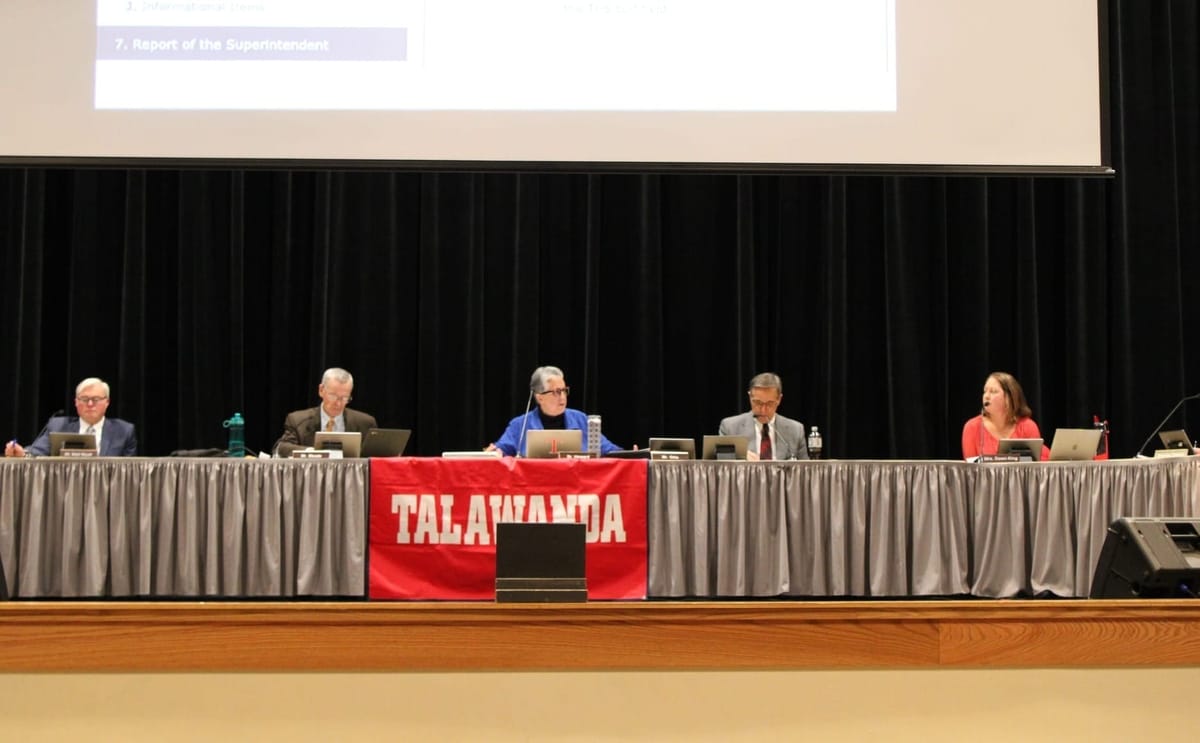Talawanda board member subject of complaint from board president
Talawanda Board of Education President Rebecca Howard alleged that Board Member Dawn King violated multiple district policies in the past year in a six-part complaint. King read the complaint during public session Jan. 9.

Talawanda Board of Education President Rebecca Howard has filed a complaint against Board Member Dawn King for alleged conduct during her first year in office.
During a board meeting Jan. 9, King read from a complaint initiated by Howard in mid-December. The complaint, obtained by the Oxford Free Press, accuses King of taking actions that “contribute to creating an environment of fear, suspicion, mistrust, and intimidation among staff, and that are clearly beyond the boundaries of the responsibilities of elected board members.”
The complaint includes six specific accusations — micromanaging district operations; intervening/interfering in disciplinary investigations or actions of students or staff prior to those actions reaching the Board level; sharing legally protected content and failing to maintain security of confidential email communications; circumventing policy and protocol in communicating with staff; publicly sharing information that could compromise student, staff and building safety; and violating policy and state regulation by illegally moving to terminate the superintendent’s contract during a public meeting.
Howard and King both declined to comment, but Howard clarified that the complaint was a board document, not a formal complaint with the Ohio Department of Workforce and Education.
King and her husband, Scotty King, have frequently been at odds with other members of the board and Talawanda administration in the past year. Last June, Dawn King called for Superintendent Ed Theroux’s resignation for “insubordination” and told the Free Press her motivations were “confidential,” but the board was aware of her reasoning. Scotty King has spoken during public comment at every board meeting since June, accusing board members and administrators of corruption and mismanagement.
The complaint and response
The complaint filed against Dawn King covers a range of conduct throughout 2024.
At a February board meeting, King began to ask detailed security questions during an agenda item to approve updates to Bogan Elementary’s security measures including card reader updates and a new intercom system. Theroux said the district would not talk about certain security measures in public and that some of the information King shared was inaccurate. Another member of the board agreed that conversations about safety and security could be more effective in private.
“Your request for information at the Board meeting is problematic in my opinion,” Theroux later wrote to King in an email obtained by the Oxford Free Press. “The answers would have compromised the safety of all.”
The following week, a student reporter from Miami University “let himself into” Bogan Elementary during morning drop-off and stated he was there to “investigate security issues at the school,” according to an email from Talawanda Communications Director Holli Hansel to Miami University faculty and administrators. Theroux forwarded that email to board members and wrote, “I fear this is a result of statements made at last week’s Board meeting.”
King defended her actions during the Jan. 9 board meeting. “I was sharing information to show the board in public that a new security system was necessary as soon as possible … I am the person who asked to have the new security system put on the agenda during that meeting to vote,” she said. “If anything I said was incorrect, I was not aware at the time.”
The complaint lists King’s questioning of security protocols, along with allegedly monitoring staff by counting cars in the parking lot and perpetuating rumors regarding staff investigations, as examples of micromanaging district operations. These actions, along with allegedly “circumventing policy and protocol in communicating with staff” by failing to notify Theroux of communications with building administrators and Human Resources, are labeled as violations of board-staff communications against District Policy 3112 in the complaint. The policy states that all official board communications of staff interest “will generally be communicated through the Superintendent” and that staff should submit communications to the board through the superintendent.
At the board’s December 2024 meeting, King said she’d reached out to a representative of the company that helps manage Talawanda’s bylaws and policies and was told that those policies were not intended to prevent her from discussing board matters with staff.
Other concerns raised by the complaint include “illegally moving to terminate the Superintendent’s contract in public session without due process” and “demeaning the evaluation process of the Superintendent” with a “blatantly subjective evaluation.” King said that Howard, not King, had acted illegally by asking for a second on King’s motion to terminate Theroux’s contract last June.
In the board evaluations of Theroux’s performance during the 2023-24 school year, King gave Theroux a score of one, or unacceptable, on all 21 measures on a scale of one to five. Howard and Meade each gave Theroux a range of threes to fives, with the lowest scores in communication and collaboration, while board member Chris Otto gave Theroux the highest score with near-unanimous fives and former board member David Bothast gave a mix of fours and fives.
In her evaluation comments, King accused Theroux of blocking data from board members, had “unprofessional and unacceptable” communication with parents and having “continual outbursts.” King provided no reasoning for giving Theroux low marks for instruction. Her ratings dropped Theroux’s overall evaluation from a 4.75 average to an average of 4.
In an addendum to the aggregated evaluation, Howard wrote that the instructional ratings in particular seemed unjustifiable considering “district ratings from the state have shown significant improvement” in the past year. “It is my opinion that Mrs. King’s evaluation was an expression of a personal agenda,” Howard wrote.
“I cannot be criticized for an evaluation that I conduct,” King said in response during the January meeting. “This is my objective opinion, and there was very little guidance given in the direction of the evaluation.”
School boards can formally censure members to express disapproval, though the Ohio School Board Association website states that censures aren’t specifically addressed in Ohio law and “do not have any direct effect on the censured board member’s legal status or authority.” No board members moved to censure King at the January meeting, though she said if they did she would “wear it like a badge of honor.”
“I’m doing exactly what I promised my constituents I would do,” King said. “I can’t say the same for the rest of the people on this stage. Trust me, if I was doing anything wrong, these fools would have contacted the state months ago. They have nothing.”
The complaint was not an agenda item at the meeting, and King chose to raise it in public session for transparency, she said. Howard did not respond to King’s comments at the meeting but said her complaint stands as-written.
“We do need to move forward, and we’ve been trying to do that for months,” Howard said at the end of the meeting. “... It’s not just frustrating, it’s somewhat tragic that all of that success, all of the amazing things that our staff and our students are doing in this district are getting overshadowed by unnecessary drama. Our job as board members is policy and finance, and I think we too often lose sight of that job.”
The Talawanda Board of Education is set to meet again at 7 p.m. Feb. 6 in the Talawanda High School Performing Arts Center. Meetings are livestreamed on the district YouTube channel.




